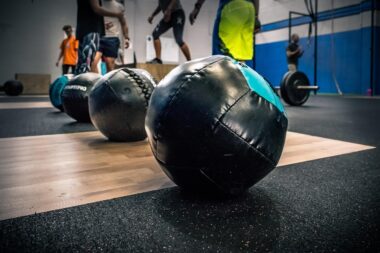The Science Behind Functional Fitness and Motivation
Functional fitness focuses on exercises that mimic everyday activities, enhancing your ability to perform them effectively. Engaging in such workouts is essential for motivation, promoting a holistic approach to health and wellness. The science of motivation is deeply intertwined with functional fitness, as functional workouts can boost self-esteem and enhance overall well-being through improvements in strength, balance, and flexibility. It’s well-researched that individuals who see tangible results in their life skills tend to be more motivated to continue their fitness journey. A strong sense of accomplishment is key for standing firm against challenges. The social aspect of group functional fitness classes can also foster a supportive environment. Training buddies can provide both emotional support and accountability, further increasing your commitment to regular exercise routines. Setting specific and realistic goals is critical in this process as well; small successes lead to greater achievement. Together, these elements create a cycle of motivation that fuels your fitness efforts, making functional fitness not just a workout but a rewarding lifestyle choice.
Another important aspect of motivation in functional fitness lies in understanding the psychological benefits it provides. Engaging regularly in functional fitness improves mood, reduces anxiety, and enhances focus. Scientific studies show that exercise stimulates the release of endorphins, often termed “happy hormones.” Regular participation in fun workouts like obstacle course training or team sports can further develop personal connections, fostering camaraderie. This sense of community not only serves as a motivational driver but helps build friendships characterized by shared goals. Taking progress photos and documenting achievements can also significantly enhance motivation levels, acting as visual evidence of improvements made over time. By recognizing and celebrating personal milestones, individuals are likely to feel rewarded. Implementing effective reward systems, such as treating oneself to new workout gear, can transform this process. Remember, motivation thrives on positivity, so surrounding yourself with affirming influences is key in this journey. Feeling part of something bigger than oneself is important, whether it’s a fitness class, a hobby group, or your local gym. All these elements come together to create a fulfilling fitness experience.
The Importance of Goal Setting
Setting specific, measurable, achievable, relevant, and time-bound (SMART) goals is crucial in staying motivated. These well-defined goals help individuals track progress effectively, maintaining excitement about fitness routines. Functional fitness encourages individuals to focus on improving functional movements, which lead to better everyday performance. Examples of SMART goals for functional fitness can include increasing the number of push-ups performed within a month or enhancing time taken to complete a set of exercises. These quantifiable goals create a sense of achievement that can be celebrated. Incorporating a variety of exercises, such as kettlebell swings or bodyweight squats, can prevent workout monotony, keeping motivation levels high. Different functional fitness activities can help identify personal preferences, ensuring long-term engagement with fitness routines. Staying adaptable is another key component; if you feel a workout routine is becoming tedious, don’t hesitate to switch things up. Most importantly, remember why you started. The mindset that focuses on personal growth and continuous improvement fosters an environment ripe for motivation, enabling individuals to push through barriers as they work toward their fitness goals.
Moreover, another vital element contributing to motivation is tracking progress and celebrating achievements, regardless of their size. Recording workouts, meal plans, or performance metrics can significantly aid self-evaluation, allowing individuals to stay connected with their goals. Regularly reassessing progress fosters feelings of satisfaction and provides an opportunity to adjust goals as needed. Many people find it helpful to maintain a fitness journal for this reason; journaling helps outline priorities and highlights progress while allowing room for reflection. Celebrating non-scale victories, like increased endurance or improved posture, reinforces positive feelings towards fitness. Consider sharing achievements on social media or discussing them with friends for additional encouragement. Additionally, using fitness apps or wearable tech enables convenient and automatic tracking. Technology can enhance motivation by providing data-driven insights into workouts and overall health. Pictures of physical transformations, alongside personal experiences, can serve to inspire and empower others following similar paths. By embracing these practices and approaching fitness with positivity, motivation becomes a natural byproduct of the experience, further solidifying commitment to functional fitness.
Creating a Supportive Environment
One significant factor that underpins motivation is creating a supportive environment. Surrounding yourself with like-minded individuals can propel you toward your goals in functional fitness. Training alongside supportive friends or participating in group classes can offer mutual encouragement, making strenuous workouts feel manageable and enjoyable. Additionally, sharing experiences with others—whether good or bad—creates a sense of belonging and understanding. Engaging with community resources like fitness groups or online forums can also greatly enhance motivation. These platforms allow individuals to seek advice, celebrate achievements, and learn new tips from those who have similar goals. Being part of such a community can bring about motivation that extends beyond oneself, driving a shared journey toward health. Implementing a buddy system is also effective; friends can hold each other accountable while providing emotional support during challenging times. Moreover, investing time in creating a workout space at home, filled with motivational quotes and reminders of why you started, can make a significant difference in your commitment levels. Always strive to cultivate an atmosphere that celebrates progress while pushing towards improvement, allowing passion for functional fitness to flourish.
In conclusion, the science of motivation is a vital component that plays a key role in achieving success with functional fitness. By focusing on setting SMART goals, tracking progress, and celebrating achievements, you can maintain unwavering motivation levels throughout your fitness journey. Moreover, fostering a supportive environment that nurtures personal connections can be an effective way of ensuring continued engagement with exercise. Understanding the psychological benefits linked to functional fitness can also create a positive framework for your mental health and emotional well-being. Emphasizing the personal empowerment gained through functional movement enhances satisfaction and leads to profound changes in lifestyle. The realization that functional fitness enables better performance in day-to-day tasks is often a powerful motivator. This understanding often creates lasting commitment and passion for maintaining a healthy lifestyle. Remember to adapt workouts to fit your strategy and find joy in diversity. Lastly, share your journey to inspire others while continuously discovering new aspects of fitness. By embracing functional fitness as a holistic approach, you’re not just working out; you’re actively enhancing your quality of life and overall happiness.
Final Thoughts on Staying Motivated
To wrap things up, the motivation behind functional fitness is essential in crafting an effective routine. Remember that everyone’s journey is unique; what works for one may not apply to another. Be sure to recognize personal preferences and make adjustments where necessary. Emphasize listening to your body, allowing for rest and recovery while incorporating fun challenges that add excitement to your workouts. Staying informed is another critical component; researching new fitness techniques or trends can help establish innovative routines, keeping you engaged in the process. Leverage social media and online platforms to explore workouts or subscribe to newsletters around functional fitness. Seek inspiration from other success stories while creating your own—sharing your story has the power to motivate others as well. Ultimately, integrate functional fitness into your lifestyle while ensuring it feels enjoyable. After all, when you revel in the journey, motivation becomes a natural byproduct. Approach each training session with enthusiasm, and over time, you will achieve not only physical improvements but emotional resilience as well. Celebrate yourself and relish in becoming the best version of you through functional fitness!






